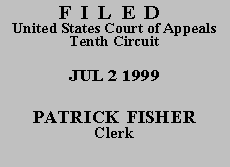

| MONTY RAY STILL,
Petitioner-Appellant, v. KEN KLINGER; ATTORNEY GENERAL OF THE STATE OF OKLAHOMA, Respondents-Appellees. |
|
Petitioner Monty Ray Still appeals from an order of the district court denying his petition for habeas relief filed pursuant to 28 U.S.C. § 2254. We affirm in part and reverse in part and remand.(1)
In 1994, Still was sentenced to fifteen-year concurrent sentences under the Oklahoma statute providing for an enhanced sentence after former conviction of a felony following his plea of guilty to charges of unlawful distribution of marijuana and a controlled dangerous substance. He took no direct appeal.
In 1997, Oklahoma enacted the Truth in Sentencing Act which changed the sentencing matrix for various crimes and modified parole and early release guidelines. Still then filed for post-conviction relief alleging that his due process rights and liberty interests had been violated when he was denied the opportunity for early parole under programs which existed prior to passage of the new Act. Still also contended the Act violated the ex post facto clause of the United States Constitution. Still concluded he was entitled to a modification of his sentence under the new Act and parole under the provisions of the prior acts.
The Oklahoma Court of Criminal Appeals denied relief and Still commenced this § 2254 action in federal district court. The federal court denied relief on the basis that Still had not raised any constitutional claims upon which he could obtain relief. On appeal, Still claims that the Act violates his ex post facto rights by eliminating the early release programs under which he had been approved for release.
On appeal from the district court's denial of a habeas petition, we review the district court's factual findings for clear error and its legal conclusions de novo. See Rogers v. Gibson, 173 F.3d 1278, 1282 (10th Cir. 1999). However, we may grant habeas relief only if the state court's decision was "contrary to, or involved an unreasonable application of, clearly established Federal law, as determined by the Supreme Court of the United States; or . . . resulted in a decision that was based on an unreasonable determination of the facts in light of the evidence presented in the State court proceeding." 28 U.S.C. § 2254(d)(1), (2).(2)
The district court correctly ruled that Still stated no viable claim as far as he requests modification of his sentence. Oklahoma prisoners are not entitled to resentencing under the new Act. See Nestell v. Klinger, No. 98-6148, 1998 WL 544361, at **1 (10th Cir. Aug. 27, 1998); see, e.g., Castillo v. State, 954 P.2d 145, 147 (Okla. Crim. App. 1998) (sentencing matrices of new Act do not become effective until July 1, 1998 and do not inflict greater punishment, thus, no ex post facto violation could occur); Nestell v. State, 954 P.2d 143, 144-45 (Okla. Crim. App. 1998) (same).
However, Still also contends that he had been approved for parole under the repealed acts and has since been denied release based on provisions on the new Act which have been applied retroactively to him. He also contends he relied on the availability of the prior early release statutes when deciding to plead guilty.
We have previously held that petitioners situated as Still have stated claims that may constitute a violation of the ex post facto clause. See McMeekan v. Klinger, No. 98-6247, 1998 WL 852551, at **1 (10th Cir. Dec. 10, 1998); Blue v. Klinger, No. 98-6159, 1998 WL 738341, at **2 (10th Cir. Oct. 22, 1998); cf. Moore v. Klinger, No. 98-6266, 1999 WL 50828, at **2, n.4 (10th Cir. Feb. 3, 1999) (affirming that petitioner had failed to state a viable claim as to his ex post facto argument because he had "failed to show his entitlement to, or projected participation in" the pre-release programs under the repealed statutes).
Thus, if Still can establish he was entitled to pre-parole or early release under the law as it existed prior to passage of the Truth in Sentencing Act, "the Act's elimination of those programs would in fact constitute a violation of the Ex Post Facto Clause." Blue, 1998 WL 738341, at **2 (citing Lynce v. Mathis, 519 U.S. 433, 445 (1997); Weaver v. Graham, 450 U.S. 24, 35-36 (1981)); see also Warden v. Marrero, 417 U.S. 653, 663 (1974) ("[R]epealer of parole eligibility previously available to imprisoned offenders would clearly present [a] serious question under the ex post facto clause . . . of whether it imposed a greater or more severe punishment than was prescribed by law at the time of the . . . offense." (quotation omitted)).
Accordingly, the judgment of the United States District Court for the Western District of Oklahoma is AFFIRMED in part and REVERSED in part. This case is REMANDED to the district court for further proceedings consistent with this order and judgment.
Entered for the Court
Senior District Judge
*. This order and judgment is not binding precedent, except under the doctrines of law of the case, res judicata, and collateral estoppel. The court generally disfavors the citation of orders and judgments; nevertheless, an order and judgment may be cited under the terms and conditions of 10th Cir. R. 36.3.
**. Honorable Wesley E. Brown, Senior District Judge, United States District Court for the District of Kansas, sitting by designation.
1. This court previously granted Still a certificate of appealability and ordered briefing from respondent as to his one issue.
2. Still filed this petition January 27, 1998. Therefore, the provisions of the Antiterrorism and Effective Death Penalty Act of 1996 ("AEDPA") apply.